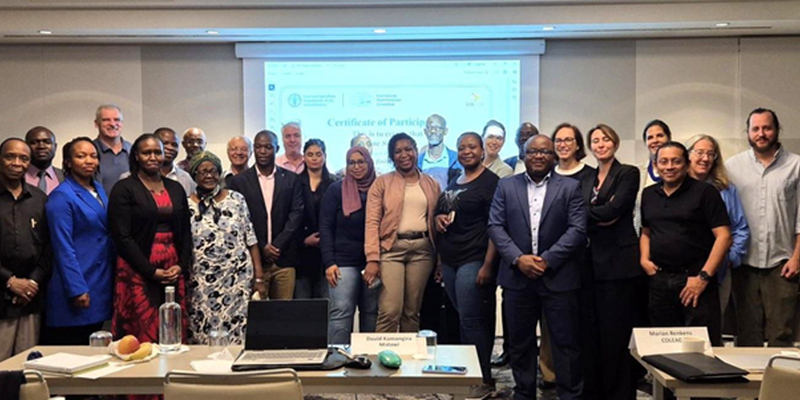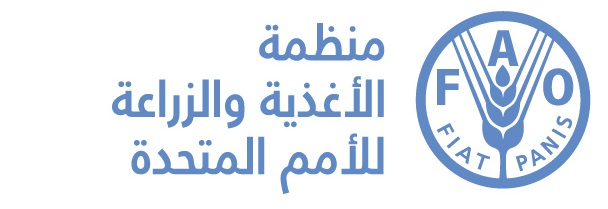تم تحقيق انجاز مهم في تعزيز قدرات الصحة النباتية في جميع بلدان COMESA
Posted on جمعة, 25 أكتوبر 2024, 07:34

©FAO
روما، 11 أكتوبر 2024. في الفترة من 7 إلى 11 أكتوبر 2024، نظمت أمانة الاتفاقية الدولية لوقاية النباتات (IPPC)، بالتعاون مع "تعزيز قدرات الرقابة على الأغذية والصحة النباتية والحوكمة (GCP/GLO/949/EC)" الذي تنفذه وحدة التنفيذ والتيسير. ويمثل هذا إنجازًا مهمًا لبرنامج تقييم قدرات الصحة النباتية PCE) حيث تعلم منسقو وميسرو PCE الوطنيون كيفية تطوير نتائج الخطط الاستراتيجية الوطنية على أفضل وجه إلى أفكار مشاريع وصياغة مقترحات مشاريع فعالة. وعلى مدار ورشة العمل، عمل المشاركون بنجاح على تطوير تسعة مقترحات مشاريع ذات صلة بالدول التي تنفذ PCEs ضمن نطاق المشروع وهي (جيبوتي ومصر وإسواتيني وكينيا وملاوي وموريشيوس ورواندا وسيشيل وأوغندا وزامبيا وزيمبابوي). تم تأمين التمثيل الإقليمي من خلال مشاركة المجلس الأفريقي للصحة النباتية (IAPSC) ، مما يضمن أن المشاريع التي تم تطويرها حافظت على أهميتها أيضًا على المستوى الإقليمي.
سلطت Sarah Brunel، رئيسة وحدة التنفيذ والتيسير في أمانة الاتفاقية الدولية لوقاية النباتات ورئيسة مجموعة عمل مرفق المعايير وتنمية التجارة (STDF) لعام 2024، الضوء في كلمتها الافتتاحية "هذه الورشة لا تتعلق فقط بالنتائج الفنية. نحن نعمل على ضمان أن يكون لهذه المشاريع تأثير دائم من خلال الحوكمة الفعالة وآليات التمويل المستدامة وستكمل عملية تقييم القدرات النباتية".
وضع مقترحات مشاريع أقوى بمشاركة نشطة من الجهات المانحة
على مدار الأيام الخمسة، تضمنت الورشة عروضًا تقديمية من كل دولة مشاركة، توضح تقدمها الحالي في صياغة مقترحات المشاريع، بعد الانتهاء من عملية تقييم القدرات النباتية وتطوير استراتيجيات تنمية القدرات النباتية الوطنية. ويشمل ذلك مراجعة الإطار القانوني للصحة النباتية في تسع من الدول المشاركة. شارك Orlando Sosa، من المكتب الفرعي الإقليمي لمنظمة الأغذية والزراعة لشرق أفريقيا (FAO) Raixa Llauger من المكتب الفرعي الإقليمي لمنظمة الأغذية والزراعة لأمريكا الوسطى (FAO)، بخبراتهما في مبادرات مماثلة لتنمية القدرات، مما قدم رؤى قيمة حول تعظيم التآزر العالمي لحماية صحة النبات والاتصال بشكل مثالي مع المكاتب الميدانية لمنظمة الأغذية والزراعة.
كان مفتاح نجاح الأسبوع هو الشراكة القوية بين أمانة الاتفاقية الدولية لوقاية النباتات و COLEAD قبل ورشة العمل، أكمل المشاركون دورة تدريبية عبر الإنترنت لمدة خمسة أسابيع ركزت على أداة التقييم السريع للصحة النباتية (R-SAT) التابعة لـ COLEAD وإكمال دورة RBM and the Logical Framework Approach" التي طورتها جامعة ولفرهامبتون. تم توجيه المشاركين حول كيفية تطبيق الأداة بما يتماشى مع نتائج PCE، باستخدام نتائجها كأساس لصياغة خطط العمل الوطنية. خلال الورشة نفسها، أجرت COLEAD عددًا من جلسات التدريب حول كيفية هيكلة مقترحات المشاريع، مع التركيز على تحقيق تأثير طويل الأمد، بما يتماشى مع الأولويات الوطنية وتوقعات الشركاء والمانحين المحتملين مع عكس إدراج دقيق لدمج النوع الاجتماعي.
وكان نقل المعرفة ذا أهمية خاصة عندما شارك سيمون باديا من صندوق تنمية العلوم والتكنولوجيا، الذي انضم إلى الورشة شخصيًا، وعدد من المانحين الذين انضموا افتراضيًا، بما هو مطلوب، من منظور المانح، عند تطوير مقترحات مشاريع ناجحة.
كما قال Simon Padilla في ملاحظاته الختامية "لقد كان من الملهم أن نرى الطاقة والالتزام اللذين جلبهما المشاركون لتطوير مقترحات المشاريع هذه. إن التعاون والتفكير الاستراتيجي الذي تم إظهاره هنا سيؤدي بلا شك إلى مشاريع مؤثرة ومبتكرة تعزز القدرات الصحية النباتية على المستويين الوطني والإقليمي. أتطلع إلى رؤية كيف تتطور هذه الأفكار وتساهم في تجارة أكثر أمانًا وأنظمة غذائية أقوى في جميع أنحاء المنطقة".
وشملت الورشة أهمية دمج النوع الاجتماعي في تطوير مقترحات المشاريع وفي إطار استراتيجية تنمية القدرات الصحية النباتية الوطنية. وقد قاد خبراء النوع الاجتماعي في منظمة الأغذية والزراعة عددًا من الأنشطة التي ساعدت المشاركين على دمج منظور النوع الاجتماعي في تصميمات مشاريعهم، مما يضمن أن المبادرات المستقبلية للصحة النباتية ستعزز الشمولية والاستدامة.
التطلع إلى المستقبل: مسار استراتيجي للمضي قدمًا
بدعم من أمانة الاتفاقية الدولية لوقاية النباتات وCOLEAD، ستعمل البلدان المشاركة الآن على تطوير مقترحات مشاريعها بشكل أكبر والتي سيتم تقديمها إلى الجهات المانحة المحتملة في عام 2025.
كما لخصها Mweene Kambombi، محلل مخاطر الآفات، المشارك من المنظمة الوطنية لوقاية النباتات في زامبيا "كانت هذه الورشة حصادًا للمعرفة؛ لتنمية النمو والمرونة في أنظمتنا الغذائية من خلال تعزيز ضوابط الأغذية والقدرات الصحية النباتية والحوكمة. مستقبل أكثر إشراقًا للأمن الغذائي والاستدامة".
تشكل هذه الورشة خطوة حاسمة إلى الأمام في تعزيز القدرات الوطنية في مجال الصحة النباتية، وإرساء الأساس لمشاريع مؤثرة من شأنها أن تشكل مستقبل صحة النبات والتجارة الآمنة وسلامة الغذاء في مختلف أنحاء أفريقيا، بالتنسيق الكامل مع .IAPSC
لمزيد من المعلومات
تقييم القدرات في مجال الصحة النباتية
تعزيز الرقابة على الأغذية والقدرات والحوكمة في مجال الصحة النباتية

